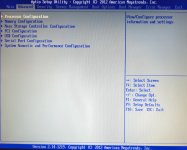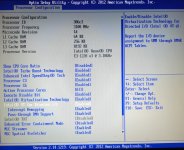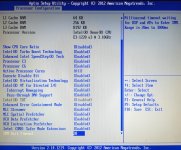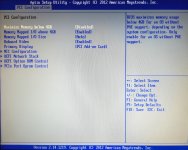Hello,
If you are using TrueNas Scale the file dmesg.boot does not exists:
Code:
root@tn-xeond[~]# ls -la /var/run/dmesg.boot
ls: cannot access '/var/run/dmesg.boot': No such file or directory
You can check with lscpu command:
Code:
root@tn-xeond[~]# lscpu
Architecture: x86_64
CPU op-mode(s): 32-bit, 64-bit
Address sizes: 46 bits physical, 48 bits virtual
Byte Order: Little Endian
...
Virtualization features:
Virtualization: VT-x
...
I can't find in your BIOS printscreen where are 8GB of RAM (there are 8MB of L3 cache).
Best Regards,
Antonio
Thanks. You are right - that screen was the L3 cache not memory. memory modules show just fine. I tried installing Windows Server 2022 and Hyper-V couldn't load for same reason (same goes for TureNAS Core) so it must be motherboard or BIOS config issue(?)
I updated BIOs to S1200RP.86B.03.02.002 (2015) using startup.nsh file but couldn't update using the later Intel® Server Board S1200RP UEFI Development Kit as it fails in the EFI SHELL -> asks me to use the UEFI SHELL when I try to load the FvUpdate_S1200RP.efi file (but I cannot seem to load/access UEFI).
This was the output from the commands you posted.
```
admin@truenas[~]$ ls -la /var/run/dmesg.boot
ls: cannot access '/var/run/dmesg.boot': No such file or directory
admin@truenas[~]$ lscpu
Architecture: x86_64
CPU op-mode(s): 32-bit, 64-bit
Address sizes: 39 bits physical, 48 bits virtual
Byte Order: Little Endian
CPU(s): 4
On-line CPU(s) list: 0-3
Vendor ID: GenuineIntel
Model name: Intel(R) Xeon(R) CPU E3-1220 v3 @ 3.10GHz
CPU family: 6
Model: 60
Thread(s) per core: 1
Core(s) per socket: 4
Socket(s): 1
Stepping: 3
CPU(s) scaling MHz: 25%
CPU max MHz: 3500.0000
CPU min MHz: 800.0000
BogoMIPS: 6185.77
Flags: fpu vme de pse tsc msr pae mce cx8 apic sep mtrr pge mca cmov pat pse36 clflush dts acpi mmx fxsr sse sse2 ss ht tm pbe syscall nx pdpe1gb rdtscp lm constant_tsc arch_perfmon pebs bts rep_good nopl xtopolo
gy nonstop_tsc cpuid aperfmperf pni pclmulqdq dtes64 monitor ds_cpl smx est tm2 ssse3 sdbg fma cx16 xtpr pdcm pcid sse4_1 sse4_2 x2apic movbe popcnt tsc_deadline_timer aes xsave avx f16c rdrand lahf_lm abm
cpuid_fault epb invpcid_single pti ssbd ibrs ibpb stibp fsgsbase tsc_adjust bmi1 avx2 smep bmi2 erms invpcid xsaveopt dtherm ida arat pln pts md_clear flush_l1d
Caches (sum of all):
L1d: 128 KiB (4 instances)
L1i: 128 KiB (4 instances)
L2: 1 MiB (4 instances)
L3: 8 MiB (1 instance)
NUMA:
NUMA node(s): 1
NUMA node0 CPU(s): 0-3
Vulnerabilities:
Gather data sampling: Not affected
Itlb multihit: KVM: Mitigation: VMX unsupported
L1tf: Mitigation; PTE Inversion
Mds: Mitigation; Clear CPU buffers; SMT disabled
Meltdown: Mitigation; PTI
Mmio stale data: Unknown: No mitigations
Retbleed: Not affected
Spec rstack overflow: Not affected
Spec store bypass: Mitigation; Speculative Store Bypass disabled via prctl
Spectre v1: Mitigation; usercopy/swapgs barriers and __user pointer sanitization
Spectre v2: Mitigation; Retpolines, IBPB conditional, IBRS_FW, STIBP disabled, RSB filling, PBRSB-eIBRS Not affected
Srbds: Mitigation; Microcode
Tsx async abort: Not affected
```




